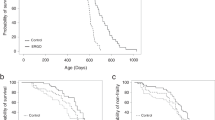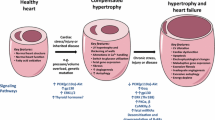Abstract
Fetal alcohol syndrome (FAS) is often associated with cardiac hypertrophy and impaired ventricular function in a manner similar to postnatal chronic alcohol ingestion. Chronic alcoholism has been shown to lead to hypomagnesemia, and dietary Mg2+ supplementation was shown to ameliorate ethanol-induced cardiovascular dysfunction such as hypertension. However, the role of gestational Mg2+ supplementation on FAS-related cardiac dysfunction is unknown. This study was conducted to examine the influence of gestational dietary Mg2+ supplementation on prenatal ethanol exposure-induced cardiac contractile response at the ventricular myocyte level. Timed-pregnancy female rats were fed from gestation day 2 with liquid diets containing 0.13 g/L Mg2+ supplemented with ethanol (36%) or additional Mg2+ (0.52 g/L), or both. The pups were maintained on standard rat chow through adulthood, and ventricular myocytes were isolated and stimulated to contract at 0.5 Hz. Mechanical properties were evaluated using an IonOptix™ soft-edge system, and intracellular Ca2+ transients were measured as changes in fura-2 fluorescence intensity (ΔFFI). Offspring from all groups displayed similar growth curves. Myocytes from the ethanol group exhibited reduced cell length, enhanced peak shortening (PS), and shortened time to 90% relengthening (TR90) associated with a normal ΔFFI and time to PS (TPS). Mg2+ reverted the prenatal ethanol-induced alteration in PS and maximal velocity of relengthening. However, it shortened TPS and TR90, and altered the ΔFFI, as well as Ca2+ decay rate by itself. Additionally, myocytes from the ethanol group exhibited impaired responsiveness to increased extracellular Ca2+ or stimulating frequency, which were restored by gestational Mg2+ supplementation. These data suggest that although gestational Mg2+ supplementation may be beneficial to certain cardiac contractile dysfunctions in offspring of alcoholic mothers, caution must be taken, as Mg2+ supplementation affects cell mechanics itself.
Similar content being viewed by others
References
Ahmed, S.S., Levinson, G.E., Fiore, J.J., and Regan, T.J. (1980). Spectrum of heart muscle abnormalities related to alcoholism. Clin. Cardiol. 3:335–341.
Regan, T.J. (1990). Alcohol and the cardiovascular system. JAMA 264:337–381.
Thomas, A.P., Rozanski, D.C., and Rubin, E. (1994). Effects of ethanol on the contractile function of the heart: a review. Alcohol. Clin. Exp. Res. 18:121–131.
Ni, Y., Feng-Chen, K.C., and Hsu, L. (1992). A tissue culture model for studying ethanol toxicity on embryonic heart cells. Cell Biol. Toxicol. 8:1–11.
Fuseler, J.W. (1993). Maternal ethanol consumption induces transient compensatory hyperplasia of developing cardiac tissue in the neonatal rat. Alcohol Alcohol. 28:657–666.
Syslak, P.H., Nathaniel, E.J., Novak, C., and Burton, L. (1994). Fetal alcohol effects on the postnatal development of the rat myocardium: an ultrastructural and morphometric analysis. Exp. Mol. Pathol. 60:158–172.
Nyquist-Beattie, C. and Freter, M. (1988). Cardiac mitochondrial abnormalities in a mouse model of the fetal alcohol syndrome. Alcohol. Clin. Exp. Res. 12:264–267.
Staley, N.A. and Tobin, J.D. Jr. (1991). Reversible effects of ethanol in utero on cardiac sarcoplasmic reticulum of guinea pig offspring. Cardiovasc. Res. 25:27–30.
Altura, B.M., Zhang, A., Cheng, T.P., and Altura, B.T. (1996). Exposure of piglet coronary arterial muscle cells to low alcohol results in elevation of intracellular free calcium: relevance to fetal alcohol syndrome. Eur. J. Pharm. 314:R9-R11.
Brilla, C.G., Scheer, C., and Rupp, H. (1998). Angiotensin II and intracellular calcium of adult cardiac fibroblasts. J. Mol. Cell Cardiol. 301:237–1246.
Hsieh, S.T., Sano, H., Saito, K., Kubota, Y., and Yokoyama, M. (1992). Magnesium supplementation prevents the development of alcohol-induced hypertension. Hypertension 19:175–182.
Brown, R.A., Crawford, M., Natavio, M., Petrovski, P., and Ren, J. (1998). Dietary magnesium supplementation attenuates ethanol-induced myocardial dysfunction. Alcohol. Clin. Exp. Res. 22:2062–2072.
DeJonge, M.H. and Zachman, R.D. (1995). The effect of maternal ingestion on fetal rat heart vitamin A: a model for fetal alcohol syndrome. Pediatr. Res. 37:418–423.
Colton, C.A., Sneli-Callanan, J., and Chernyshev, O.N. (1998). Ethanol induced changes in superoxide anion and nitric oxide in cultured microglia. Alcohol. Clin. Exp. Res. 22:710–716.
Miller, D.J. and MacFarlane, N.G. (1995). Intracellular effects of free radicals and reactive oxygen species in cardiac muscle. J. Hum. Hypertens. 9:465–473.
Ferrari, R., Agnoletti, L., Comini, L., Gaia, G., Bachetti, T., Cargnoni, A., et al. (1998). Oxidative stress during myocardial ischaemia and heart failure. Eur. Heart J. 19:B2-B11.
Altura, B.M. and Altura, B.T. (1987). Peripheral and cerebrovascular actions of ethanol, acetaldehyde and acetate: relationship to divalent cations. Alcohol. Clin. Exp. Res. 11:99–111.
Posner, P., Baker, S.P., Carpentier, R.G., and Hennemann, W.W. (1987). Effect of long-term ethanol consumption on the rat ventricle. Alcohol Drug Res. 7:371–381.
Ren, J. and Brown, R.A. (2000). Influence of chronic alcohol ingestion on acetaldehyde-induced depression of cardiac contractile function. Alcohol Alcohol. 35:554–560.
Nickola, M.W., Wold, L.E., Colligan, P.B., Wang, G-J., Samson, W.K., and Ren, J. (2000). Leptin attenuates cardiac contraction of rat ventricular myocytes: role of nitric oxide. Hypertension 36:501–505.
Danziger, R.S., Sakai, M., Capogrossi, M.C., Spurgeon, H.A., Hansford, R.G., and Lakatta, E.G. (1991). Ethanol acutely and reversibly suppresses excitation-contraction coupling in cardiac myocytes. Circ. Res. 68:1660–1668.
Loser, H., Pfefferkorn, J.R., and Themann, H. (1992). Alcohol in pregnancy and fetal heart damage. Klin. Padiatr. 204:335–339.
Thomas, A.P., Rozanski, D.J., Renard, D.C., and Rubin, E. (1994). Effects of ethanol on the contractile function of the heart: a review. Alcohol. Clin. Exp. Res. 18:121–131.
Figueredo, V.M., Chang, K.C., Baker, A.J., and Camacho, S.A. (1998). Chronic alcohol-induced changes in cardiac contractility are not due to changes in the cystolic Ca2+ transient. Am. J. Physiol. 275:H122-H130.
Guarnieri, T. and Lakatta, E.G. (1990). Mechanism of myocardial contractile depression by clinical concentration of ethanol. A study in ferret papillary muscles. J. Clin. Invest. 85:1462–1467.
Adickes, E.D., Mollner, T.J., and Makoid, M.C. (1993). Teratogenic effects of ethanol during hyperplastic growth in cardiac myocyte cultures. Alcohol. Clin. Exp. Res. 17: 988–992.
Rajiyah, G., Argarwal, R., Avendano, G., Lyons, M., Soni, B., and Regan, T.J. (1996). Influence of nicotine on myocardial stiffness and fibrosis during chronic ethanol use. Alcohol. Clin. Exp. Res. 20:985–989.
Al-Abed, Y., Mitsuhashi, T., Li, H., Lawson, J.A., FitzGerald, G.A., Founds, H., et al. (1999). Inhibition of advanced glycation endproduct formation by acetaldehyde: role in the cardioprotective effect of ethanol. Proc. Natl. Acad. Sci. USA 96:2385–2390.
Altura, B.M. and Altura, B.T. (1984). Magnesium, electrolyte transport and coronary vascular tone. Drugs 28:120–142.
Flink, E.B. (1986). Magnesium deficiency in alcoholism. Alcohol. Clin. Exp. Res. 10:590–594.
Altura, B.M. and Altura, B.T. (1985). New perspectives on the role of magnesium in the pathophysiology of the cardiovascular system. II. Experimental Aspects. Magnesium 4:245–271.
Author information
Authors and Affiliations
Corresponding author
Rights and permissions
About this article
Cite this article
Wold, L.E., Norby, F.L., Hintz, K.K. et al. Prenatal ethanol exposure alters ventricular myocyte contractile function in the offspring of rats. Cardiovasc Toxicol 1, 215–224 (2001). https://doi.org/10.1385/CT:1:3:215
Issue Date:
DOI: https://doi.org/10.1385/CT:1:3:215




